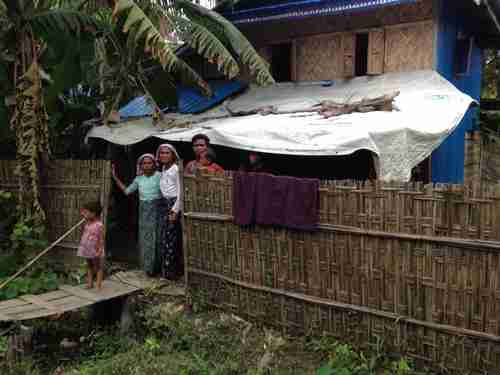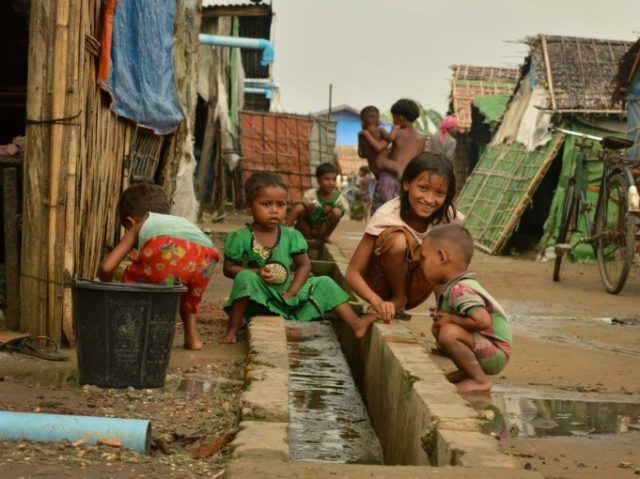This morning’s key headlines from GenerationalDynamics.com
- Nine Myanmar (Burma) police killed in coordinated attacks on Bangladesh border posts
- Fears grow of new wave of Buddhist vs Rohingya communal violence
Nine Myanmar (Burma) police killed in coordinated attacks on Bangladesh border posts

Rohingya family in Rakhine State in Myanmar (Burma)
Nine Myanmar police were killed, with four others injured and one still missing, when some 20 militants conducted coordinated attacks on three border posts along the Bangladesh border. The attacks took place around 1:30 am on Sunday morning. The attackers were armed with swords and spears, as well as conventional firearms, and they made off with more than 10,000 rounds of ammunition and dozens of guns. Eight militants were killed, and two others were captured alive.
The attacks took place in Rakhine State, which was the site of mass communal ethnic violence by Buddhist Burmese against Muslims in the Rohingya ethnic group in 2012.
No one has claimed credit for the attacks, but it’s believed the attacks were in revenge for the Buddhist attacks on Rohingya Muslims, and for plans announced last month by the government to demolish 12 mosques and 35 madrasas (religious schools) in Rakhine State because they had been built without permission.
Police are not making a statement on the identities of the captured militants, but police are saying that they’re neither Myanmar nationals nor Rohingyas, but that they received help from Rohingyas. Myanmar Times and Dhaka (Bangladesh) Tribune and Anadolu (Turkey) and The News (Pakistan)
Fears grow of new wave of Buddhist vs Rohingya communal violence
There was a burst of violence of Buddhists attacking Muslims in June 2012, triggered by an alleged rape of a Buddhist Rakhine girl by Muslim Rohingyas.
In October of that year, there was a much worse wave of violence and massacres described as a genocidal “scorched earth attack” by Buddhists, killing dozens of Muslims, destroying 2000 homes, and forcing thousands of refugees into squalid refugee camps which already house hundreds of thousands of Rohingyas.
The Rohingya have a darker skin than Burmese, and they speak a Bengali dialect. They are, for all practical purposes, a stateless ethnic group, living on the Bangladesh-Burma border, but rejected by both countries. In fact, Burma refuses to identify the Rohingya as a unique ethnic group, preferring to call them Bengali, and referring to them as illegal immigrants from Bangladesh. Burma is almost entirely a Buddhist state, including the Rakhine ethnic group that make up most of the population of Rakhine state.
Then in April 2013, 20 Muslim boys were taken from a madrassa, and hacked to death, their bodies soaked in petrol and set alight. This was part of a much larger wild, frenzied attack by Buddhists on Muslims that killed dozens and reduced an entire established community of 12,000 Muslims, including homes, shops and mosques, to ashes and rubble. Police watched and did nothing while thousands of people — women, monks, young people — cheered when someone was killed.
The level of hysteria was similar to Kristallnacht, November 9, 1938, when thousands of Germans cheered at seeing the the Nazis torch synagogues, vandalize Jewish homes, schools and businesses and kill Jews.
It’s now feared that the Sunday’s killing of the border guards Rohingya-linked militants will trigger another wave of mass slaughter of Muslims by Buddhists. According to Vijay Nambiar, UN envoy to Myanmar:
At this delicate juncture, the local communities at all levels must refuse to be provoked by these incidents and their leaders must work actively to prevent incitement of animosity or mutual hatred between Buddhist and Muslim communities.
Myanmar authorities have sent troops into Rakhine State to prevent further violence. But the troops are also going to be hunting for any Rohingyas who might have been involved in Sunday’s attack. Thus it’s possible that the troops may not fail to prevent violence, they may trigger new violence. UN News Center and Radio Free Asia and Saudi Gazette
Related Articles
- Meiktila, Burma, violence has echoes of Kristallnacht (05-Apr-2013)
- U.N. alarmed as ethnic violence grows in western Burma (Myanmar) (27-Oct-2012)
- Burma (Myanmar) declares state of emergency over Buddhist/Muslim violence (11-Jun-2012)
KEYS: Generational Dynamics, Myanmar, Burma, Rakhine State, Rohingyas, Bangladesh, Vijay Nambiar, Kristallnacht
Permanent web link to this article
Receive daily World View columns by e-mail

COMMENTS
Please let us know if you're having issues with commenting.